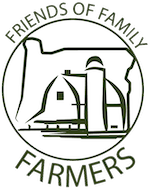FoFF is proud to support provisions that strengthen our local food system in the face of the ongoing drought and other climate driven challenges. This package was introduced by Reps Helm and Owens, and FoFF collaborated with our partners at the Oregon Community Food Systems Network (OCFSN) and the Oregon Farmers Market Association (OFMA) to design some components to strengthen our farmers, direct to consumer markets and community food systems across the state.
Check out the full package here
We are very excited to report that the “components” we requested were included in the first released draft of the package. The reality is that not everything that is represented in the current package will get funding. So we need to let lawmakers know how important these pieces are to the package as a whole! Here are the details on the pieces we care most about:
Component 4-7: OCFSN Disaster and Drought Resilience Funding
This component allocates $3M for a drought resilience and relief program through OCFSN. This is building on the successful distribution of $1.5M of funding from the state in 2022 to address the climate driven natural disasters in 2021. Because this coalition (and with FoFF as a contractor for outreach and engagement) has demonstrated our ability to equitably, thoughtfully, and thoroughly distribute funds to the farmers we serve when they are in need, we are advocating for this fund to be renewed and expanded to include funds for pre-emptive drought resilience. Resilience grants will be direct payments to farmers to buy infrastructure, upgrade systems, or shift toward drought resistance through perennial or pasture plantings. Exact activities and eligible projects will be determined by the OCFSN advisory committee for this project (the same as the disaster relief funds in the last round).
What Legislators need to know
The main thing we need to emphasize for legislators is why this funding is necessary in addition to the funding for continued disaster and drought relief through ODA via the ODAP program. OCFSN has well documented barriers to the ODAP program that made it less accessible to our farmers, and will submit those as part of the testimony on this bill. Lawmakers also need to hear from you that these two programs are different and necessary. Here are the main points:
- The OCFSN fund prioritized BIPOC farmers and was only open to small farms with under $300,000 of revenue
- The OCFSN funds are grants, which are more accessible to small farms than the forgivable loans in the ODAP program.
- We are using a network of trusted organizations to reach farmers who do not see themselves in or have good relationships with ODA programs.
- Our application process was less burdensome paperwork wise and involved more one on one attention from the grant administrator, so it was open to more new and first time farmers.
Component 4-8: OFMA and OCFSN Food Hub Funding
This component is about strengthening the community food system, specifically farmers markets and  food hubs in the face of continued drought and related natural disasters. The Oregon Farmers Market Association (OFMA) will receive $2M for direct support to markets to mitigate the impacts of drought and related disasters. This means that markets can pay their manager when the market is canceled or be compensated for lost vendor fees to stay afloat. Keeping markets operating gives more opportunities to local farmers and maintains a constant community access point for local food. There is also $500,000 represented in this section for OFMA to continue its work in supporting markets in taking SNAP, offering technical assistance, and paying for equipment and software.
food hubs in the face of continued drought and related natural disasters. The Oregon Farmers Market Association (OFMA) will receive $2M for direct support to markets to mitigate the impacts of drought and related disasters. This means that markets can pay their manager when the market is canceled or be compensated for lost vendor fees to stay afloat. Keeping markets operating gives more opportunities to local farmers and maintains a constant community access point for local food. There is also $500,000 represented in this section for OFMA to continue its work in supporting markets in taking SNAP, offering technical assistance, and paying for equipment and software.
There is also $1.2M written into this section for the Food Hub Network currently operating out of the working group at OCFSN to do drought resilience work through their food hubs including expanding access, investing in food hub infrastructure, or supporting producers as the group sees fit. This is also a crucial outlet for communities to access aggregated local products.
What Legislators need to know
Both of these local food outlets are crucial to the success of our local, community minded farmers, and to the resilience of our rural communities. We need legislators to prioritize the support of these sales outlets to keep local farms viable and provide sales outlets for new and beginning farmers to build their business. Here are some points we want to make:
- Farmers markets are essential businesses and in times of crisis (like the pandemic) when the centralized food system fails they provide safe, reliable access to crucial, nutritionally dense food for our communities.
- Farmers markets have millions of visitors each year and generate an estimated $60M of sales each year according to OFMA’s data.
- Food Hubs and farmers markets can serve as business incubators for small and new farms to help them reach new customers, establish their brand, and grow into reliable sources of local food for their communities.
- Local and community food systems are good for rural economies. Encouraging this type of farming and these outlets supports the farms that, according to a study from OSU, create more jobs per $1M in sales, put more money directly into the local economy, and generate more economic activity for other local businesses than commodity farms.

